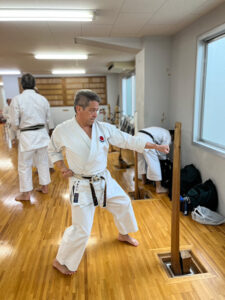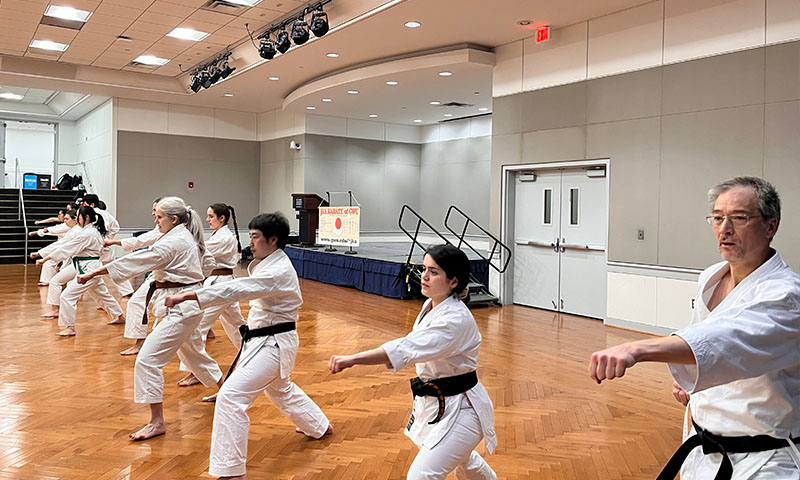Embracing Budo Philosophy: Resilience through Japanese Karate and Education By Dr. Paul Linehan
I have been a lifelong student of Japanese martial arts (budo), from studying Okinawan karate as a child to Judo with the Tokyo Police, and as a practitioner of traditional Japanese karate through the Japan Karate Association (JKA). My 20-year affiliation with the George Washington University (GWU), began when I first studied under Sensei Kenichi Haramoto, 7th Dan, Japan JKA, and now serve as a faculty member and karate instructor. I have drawn many life lessons from Sensei Haramoto, particularly from his inspiring karate journey, which included founding university clubs in the San Francisco Bay Area at Stanford University, the University of California – San Francisco, and the University of San Francisco. All of these clubs continue to flourish because of Sensei Haramoto’s comprehensive approach to teaching traditional Japanese martial arts, which encompasses more than just the physical aspect of studying moves and techniques. His promotion of JKA Karate teaches his students the importance of harmonizing body, mind, and spirit.
I grew up in the inner city, in the predominantly Irish, street-tough neighborhood of South Boston, and our house was the quintessential “Melting Pot.” My father was a first-generation Boston Irish, my mother was Japanese, and our “Nonna,” Angelina, a Sicilian widow, lived on the first floor. We shared an immigrant connection, embraced our ethnic diversity, but first and foremost, we were proud to all be united as Americans with a common life goal of a strong community and country.
Growing up in this inner-city environment was tough. I experienced discrimination, racism, and was bullied at times, and this motivated me to learn Japanese karate as a means of self-defense, and developing confidence and resilience. It was at this time that I discovered many of the values and principles of the Boston Irish Street were similar to those of Japanese “budo” – discipline, respect, perseverance, loyalty, courage, benevolence, honesty, honor, and self-control.
At the heart of “budo” is resilience, perseverance, and remaining calm in the face of adversity. Everyone experiences adversity in various forms, whether it is bullying, discrimination, hatred, racism, abuse, or violence. What one chooses to do in response makes all the difference in one’s attitude, emotional health, and approach to life. In my case, I turned to sports, physical activities, and martial arts, and the rigorous training that karate demands. This instilled in me a sense of commitment, focus, and discipline that resonates in every aspect of my life today.
The calmness and mental clarity I have learned in Japanese martial arts have also saved my life. On June 14, 2017, in Alexandria, Virginia, I survived a mass shooting that occurred during a practice session for members of Congress for the annual Congressional Baseball Game. During my morning walk around the park, I suddenly found myself caught in the middle of the mass shooting, but by maintaining sharp 360-degree mental awareness and remaining calm, I was able to evade danger and escape unharmed.
Japanese karate has taught me that physical mastery is enhanced by mental clarity and self-discipline, which in turn shape academic pursuits, enabling me to approach challenges with patience and resilience. As I teach GWU students, I emphasize the importance of discipline in both their studies and life. I encourage them to set goals and remain committed to their pursuits, mirroring the commitment one learns in the dojo.
Thus, the importance of life balance extends beyond physical discipline by fostering character, discipline, and academic excellence, as taught in the Japanese philosophy of “bunbu-ryodo” (excellence in academics and martial arts, as exemplified by the student-scholar athlete). Bunbu-ryodo is a unique blend of physical education and character development that instills values such as perseverance, resilience, respect, and self-control —essential elements of character formation. This philosophy aligns with my conviction in fostering well-rounded individuals who are not only scholars but also confident, compassionate, and responsible global citizens.
In karate, a culture of mutual respect fosters a supportive community. When students feel respected and valued, they are engaged and embrace their struggles as opportunities for growth rather than insurmountable barriers. This philosophy has helped many of them develop a healthier relationship with “success and failure,” to become resilient in understanding that setbacks are simply stepping stones towards success.
Through my journey in JKA, I have also come to appreciate the importance of lifelong learning and mentorship, crucial aspects of the budo philosophy. Having had the privilege of learning from Sensei Haramoto, I feel compelled to give back. I strive to be a mentor to my students, fostering a space where they can seek guidance and support. Whether it involves them in club activities or encourages their participation in community outreach, I seek to create pathways for growth that extend beyond the classroom.
The tenets of Japanese budo have profoundly influenced my life and teaching at GWU, instilling in me a sense of discipline, respect, perseverance, and harmony, which shape not only my approach to karate but also my role as an educator and mentor. As I continue to share these values with my students through the practice of traditional Japanese karate, I aim to empower them to lead lives rooted in these principles, nurturing the next generation that embodies the spirit of budo both inside and outside the dojo. In a world that often feels fragmented, the lessons learned from my Japanese karate journey serve as a powerful reminder of the importance of balance, respect, perseverance, and resilience in our collective pursuit of excellence and personal growth. ❦
 About the Author
About the Author
Dr. Linehan is a geo-strategic security consultant specializing in global security and government affairs, and international security programs associated with defense and military capability, innovation and technology advantage, emerging threats, strategic competition, trade and economic statecraft, and strategic risk analysis and mitigation. He is also an adjunct lecturer at the U.S. Department of State, Foreign Service Institute; Boston College; and Keio University; faculty member at George Washington University; senior advisor to the Japan Society; executive management consultant, and a senior fellow at a Pentagon think-tank – the Center for Naval Analyses.
Dr. Linehan’s decades of professional experience and federal government service have been devoted to managing a range of Indo-Pacific business, defense, intelligence, and national security affairs. In his final assignment in the Office of the Under Secretary of Defense for Policy, he served as the Director, Indo-Pacific for the National Disclosure Policy Committee and U.S. Designated Security Authority as U.S. Government lead expert for international security agreements, security certification of defense programs, industrial security, and national disclosure policy for the Indo-Pacific region.
Prior to government service, Dr. Linehan had private sector experience in Tokyo, Japan at a multinational corporation and as adjunct faculty at Oberlin University, Tokyo. He has lived abroad for 13 years in Asia and Europe.
